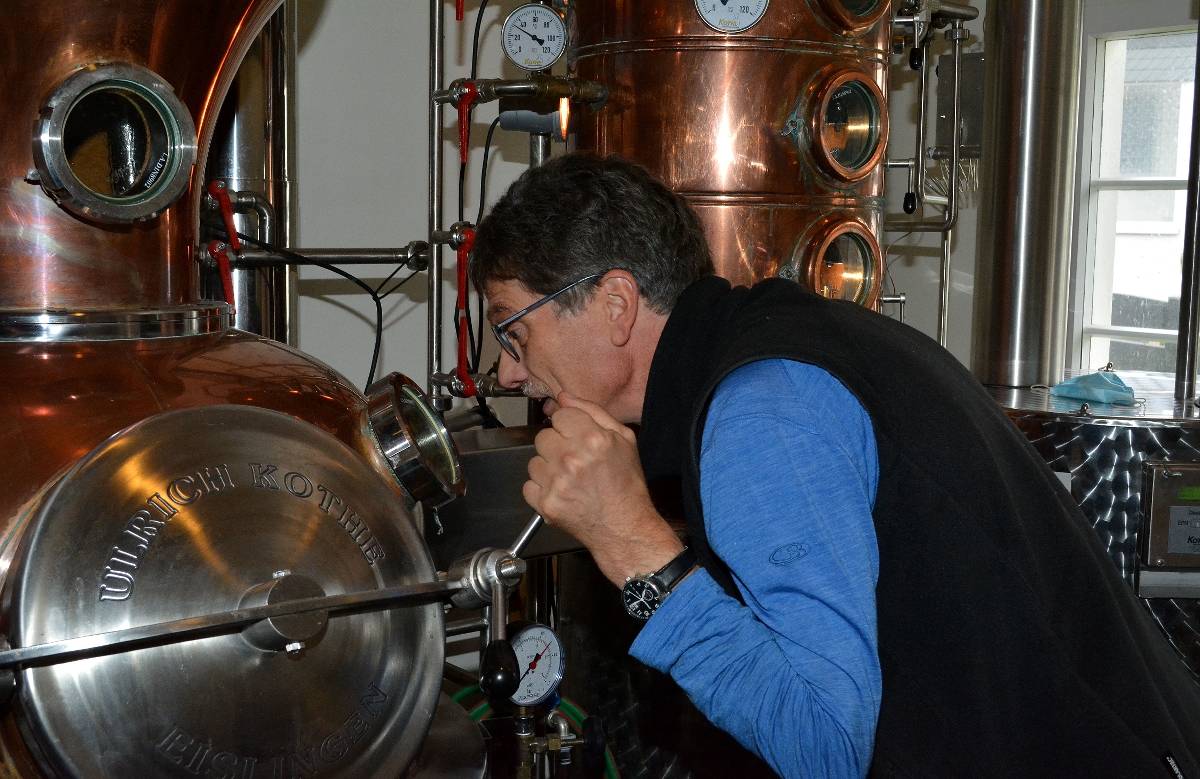Trend for regional products Village distillery in Windeck is making gin with local aromas
Rhein-Sieg-District · Muure Gin, Siegfried, Gin Cologne: In Windeck Frank Ginsberg produces fruit brandies and local varieties of gin which are known throughout Germany. GA puts them to the test.
Autumn is peak season at the Windeck village distillery. Apples, pears, plums and mirabelles are fermenting in barrels in the historic timbered house on Bergstrasse in Rosbach. Later in the distillery, only about three litres of usable alcohol are produced using 100 kilos of fruit. This is also how the price is reached for the premium spirits, which are available for tasting at the top of the gallery.
Not everything that flows from the bonded distillery’s tap into the tasting glass is drinkable. 200 litres of mirabelle plum mash is in the stirrer right now. The first distilled product, the fore shot, smells of glue and nail polish remover. "The middle part is what we want," explains Ginsberg, who constantly checks how the overall structure of smell and taste develops during the distilling process.
Ginsberg is not allowed to simply tip the fore shots down the sink. He collects the leftovers and disposes of them at the treatment plant, where they are precisely controlled. "The man from customs comes with me." The 56-year-old only has to pay tax on the alcohol he markets.
To produce the gin, Ginsberg buys original alcohol with agricultural origin. "The main ingredient of gin must be the juniper berries, then everyone makes their own recipe," he explains. The village distillery is represented on the growing regional gin market with its varieties Win Gin and Feld und Wiesen Gin. "I had always associated gin with the Queen Mother, but my son managed to convince me," says Ginsberg.
The trend for local gin started with Monkey 47 from the Black Forest, which was the first German gin to be named the world’s best gin in 2011. For comparison, Ginsberg always has one of the typical apothecary bottles with the monkey label to hand.
Family Recipe with Juniper Berries
At the entrance to the distillery hang gold medals from the Austrian Destillata, which only evaluates and awards prizes to distillates without added sugar. The name Win Gin does not come from the word ‘Gewinnen’ (winning or gains), but from Windeck. The family recipe contains juniper berries which were important to the grandfather, aniseed from the father and rose petals from the son.
For the Feld und Wiesen Gin, the Ginsbergs combine wayside plants such as nettles, dandelions and corn poppy to create a special aroma. "I very rarely drink gin with tonic water. It is important to me that everything I make can be drunk straight," says the 56-year-old. This is exactly what the GA editorial team's gin tasting session two weeks ago clearly showed (see below).
The small village distillery takes orders. For example, it produces the Ölligsbirne brandy (an onion-shaped pear grown in the Rhineland) for the Biological Station in Eitorf as well as Ralph Gemmel’s Muure Gin from Sankt Augustin. And gin can also be rock'n'roll: Ginsberg came up with the idea of a collaboration for the Rosbach festival with the group Kärbholz. He distilled a gin with blackberries, hops and liquorice for the musicians from Ruppichteroth. The 400 bottles sold out on a single Sunday afternoon.
Wine Brandy and Rum
Ginsberg opened his distillery in 2011. It is located opposite the Rhein-Sieg District’s Small Jewish Teaching House in the middle of the old village centre of Rosbach. The idea for using the building for a distillery came about during the renovations of the half-timbered house in accordance with the regulations for listed buildings. "I have always enjoyed drinking a good fruit brandy", says Windecker, who attended distillation courses at the University of Hohenheim.
He is always trying out new things. Last year Ginsberg made his first wine brandy because his wife likes to drink cognac. His favourite is "quite clearly the quince brandy", because the hard, furry fruits are particularly hard to process. "I have also discovered a love for rum." His first grandson can celebrate his 18th birthday with his own rum, which is maturing in a wooden barrel bearing his name as a present.
Ginsberg has put together "Three for the road" as a small "travel emergency kit" - chamomile spirit, fennel spirit and peppermint spirit - and a sweet strawberry mixture is also a must in the range. As Wilhelm Busch once wrote: "It is an ancient custom: If you have worries, you have liqueur!“
(Original text: Bettina Köhl, Translation: Caroline Kusch)
Windecker Dorfbrennerei, Bergstraße 10, Rosbach, Tel.: 02292 9290992, open on Wednesdays and Fridays from 3pm to 6pm, Saturdays from 9am to midday and by appointment, www.windecker-dorfbrennerei.de (website in German)




